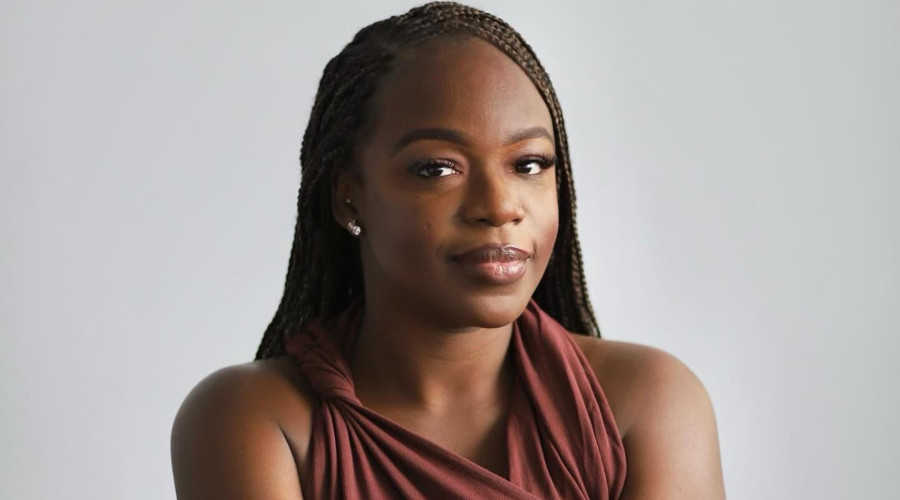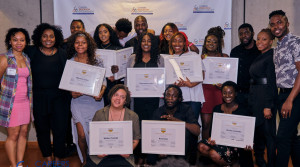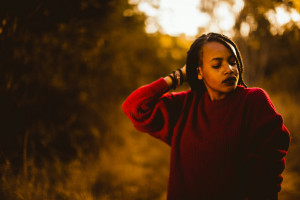Joëlle Kabisoso was like any other 17-year-old high school senior who wanted to party with her friends. Her life changed forever on a trip from Hamilton to Quebec during Spring break 2013, where she was the victim of a racially motivated gang rape.
“Some of my friends said they knew some guys who had alcohol in their room. We all went together, but I have very little recollection of what happened next,” says Joëlle. “I woke up in my hotel room with bruises and just a bunch of questions that I didn't really have answers to.”
Unsure of what to do next and what happened to her, Joëlle and her friends returned to Hamilton as planned without much discussion of the evening.
She was shocked when she came across photos of herself on Twitter topless and nude with a horrifying riddle as a caption: ‘Two little monkeys jumping on the bed, one got raped and the other one bled.’
“When I saw that tweet, I immediately contacted the police to let them know what had happened to me and to see if we could get to the bottom of it.”
Joëlle was too scared to tell her parents, so she went to the police alone, thinking the social media post was enough evidence.
“I don't think that they fully investigated the matter as they should have, given the fact that my assault was both the intersection of gender-based violence and a hate crime.”
Joëlle shared that the police contacted two of the five men and suggested that she reach out to have them remove the video. “Following that [the detective] said, ‘if you were to press charges, it would register them as sex offenders, and it would essentially ruin their lives’.”
The detective suggested Joëlle drink less moving forward. Joëlle knew she hadn’t had very much to drink, though that shouldn’t matter. She later learned this group of men were known for drugging the drinks of women.
Joëlle’s friends refused to provide statements as everyone was afraid of getting their parents and the school involved. The police told Joëlle not much could be done without the other girls’ statements however they would forward the case to the Montreal police as that was where the incident had occurred.
Joëlle explains she felt extremely unprotected by the system. Feeling isolated and suicidal, she never expected to live long enough to graduate from university.
“There were a lot of people that I was being mindful of, without realizing the emotional and psychological effects that it would have later on in my life. I didn't file charges, and I just kept thinking that I didn't want to ruin these guys' lives. Then, I learned that one of the perpetrators had become a professional football player.”
It would take five years for Joëlle ever to tell her mother what happened that day.
At a church retreat, in front of her mother, Joëlle publicly thanked God for helping her persevere through this trauma. Shortly after opening up to her community and family, she was contacted about a gender-based violence campaign. This led Joëlle to become the face of the Black Youth Action Plan, representing Black youth in Hamilton who have experienced violence. Through the campaign, Joëlle received an outpouring of support from women with shared lived experiences. Many encouraged Joëlle to start her own platform around these issues, and Sisters in Sync was born.
Sisters in Sync launched with a prom to allow girls who had this joyous moment stolen from them to live out a pivotal moment from their youth. She adds that their goal is “not only to support survivors but also to help Black women and girls feel empowered, to have access to different resources and opportunities.”
{https://www.instagram.com/p/C_Q69toRs8M/?hl=en}
While Joëlle’s experience with reporting to the police added to her trauma, she encourages people to report still. “The experience of Black women and girls with gender-based violence is not well represented in Canada statistics because a lot of us are not disclosing our stories.”
Now, as a consultant on gender-based violence and hate crimes, Joëlle represents Sisters in Sync on Hamilton Police’s anti-hate crime board ensuring Black women and girls are represented. She says that Black women and girls are disproportionately affected by gender-based violence in part, due to adultification bias. “This bias views Black women and girls as more mature than they actually are and as less deserving of protection.” Joëlle adds that Black women are often oversexualized as well, especially on social media, contributing to the violence against us.
{https://www.instagram.com/p/C_LdyEqR9S7/?hl=en}
Joëlle feels that social media has made gender-based violence more easily achievable in an increasingly dangerous world. “As a whole, it's getting worse, especially because there's no regulations on AI.”
Joëlle’s research shows that Black women and girls are more often the target of cyber violence. “They're experiencing cyberviolence even more than their white counterparts, especially on Twitter.”
Joëlle feels parents and caregivers need to be better educated. “I think many of our parents are unaware of all these social media pages that exist. They don't know a lot of the safeguards to put in place. Parents need to have better digital literacy. Several organizations and companies offer training for parents. It’s also important that parents create profiles on these platforms themselves to understand what they do.”
Joëlle learned she was being honoured with a Governor General’s award the day before this interview. Through the Law Foundation of Ontario, she has received funding to expand programs, and her hope is to expand Sisters in Sync's international footprint.
On October 11th, Sisters in Sync will host the You Go, Girl!Awards, which honour Black girls aged 8-21 for their potential and achievements.
{https://www.instagram.com/p/C-8FIFiJeQw/?hl=en&img_index=1}

 By
By 





